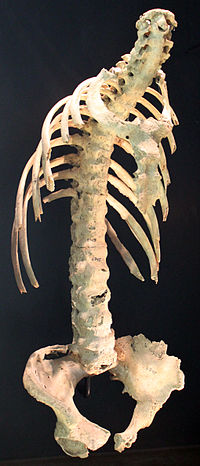
Photo from wikipedia
For chronic diseases like ankylosing spondylitis (AS), improving patients quality of life (QOL) is one of the main aims of the therapy. Sleep quality is an important determinant of QOL.… Click to show full abstract
For chronic diseases like ankylosing spondylitis (AS), improving patients quality of life (QOL) is one of the main aims of the therapy. Sleep quality is an important determinant of QOL. Restless leg syndrome (RLS) is a frequent disorder that disturbs patients QOL.The aim of this study is to evaluate the sleep quality of patients with AS and to determine the possible reasons of sleep disorder like pain, disease activity, functional status, depression, anxiety, presence of RLS and their impact on patients QOL.One hundred twenty two patients with ankylosing spondylitis were enrolled in the study. Quality of life was evaluated by using short form-36 (SF-36). Beck depression and Beck anxiety indices were used to evaluate the mood of the patients. Sleep quality was determined with Pittsburg Sleep Quality Index. International Restless Leg Study Group (IRLSSG) criteria was used to determine the co-existing restless leg syndrome. Demographic data including age, sex, height, weight, marital status, educational status, disease duration and medical treatments were noted. BASDAI (Bath ankylosing spondylitis disease activity index),BASMI (Bath ankylosing spondylitis metrology index) and BASFI (Bath ankylosing spondylitis functional index) are determined and perceived pain level was evaluated by visual analog scale for pain (VASpain) for all patients.According to Pittsburg Sleep Quality Index 48 patients (39.3%) had bad sleep quality. When patients with bad sleep quality were compared with the patients with good sleep quality according to SF-36, BASDAI, BASMI,BASFI, VAS pain, Beck depression and Beck anxiety indices worse scores were obtained in patients with bad sleep quality. The difference between two groups were statistically significant for almost all of the listed parametres (Table-1). Restless leg syndrome (RLS) was determined in 36.06% (44/122) of AS patients. RLS was more common in patients with bad sleep quality but the difference did not reach statistical significance.Sleep disorders are common in patients with AS and these disorders are found to be closely associated with pain, disease activity, anxiety, depression and poor quality of life. Restless leg syndrome (RLS) is also common in patients with AS and it is not always associated with bad sleep quality. RLS was determined in 32.4% (24/74) of patients whose sleep quality is good according to the Pittsburg Sleep Quality Index. So to improve the quality of life in AS, presence of RLS must be evaluated along with the sleep quality.[1]Tekatas A,. Pamuk ON. Increased frequency of restless leg syndrome in patients with ankylosing spondylitis. International Journal of Rheumatic Diseases, 2015, 18, 58-62.Table 1.Parametresmedian (min-max)Good sleep QualityBad sleep qualityPSF36 physical functioning85(20-100)65(25-100)0,0001SF36 Social functioning87,5(25-100)62,5(12,5-100)0,0001SF36 Role physical100(0-100)0(0-100)0,0001SF36 Role emotional100(0-100)33,3(0-100)0,003SF36 Mental health74(20-100)52(12-88)0,0001SF36 Vitality55(10-90)30(0-80)0,0001SF36 Bodily pain88,8(11,1-100)44,4(0-100)0,0001SF36 General health50(15-100)35(0-95)0,0001Beck depression5 (0-28)14.5 (1-44)0.0001Beck anxiety5.5 (0-45)14.5 (1-49)0.0001BASDAI1.6 (0- 5.91)3.8 (0.8-8.3)0.0001BASFI1.2 (0- 8.1)2.85 (0.3-7.6)0.0001BASMI1 (0-9)1.5 (0-8)0,087VAS pain1 (0-8)5 (0-10)0.0001Restless Leg Syndrome (%)32.4%(24/74)41.7% (20/48)0.299None declared
Journal Title: Annals of the Rheumatic Diseases
Year Published: 2020
Link to full text (if available)
Share on Social Media: Sign Up to like & get
recommendations!